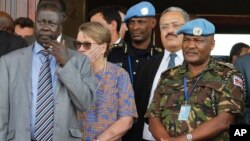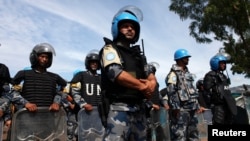Kenya’s U.N. ambassador said Thursday that the Kenyan general who was in charge of peacekeepers in South Sudan during a violent episode in July has been made a ‘scapegoat’ for systemic U.N. peacekeeping failures.
Ambassador Macharia Kamau told reporters that an internal U.N. investigation into events during July 8-11, was conducted with a “preordained outcome in mind.”
“The investigation, we have come to conclude, is shameful, unfair and an exercise in scapegoating,” Kamau said at a news conference.
An independent investigation team appointed by U.N. Secretary-General Ban Ki-moon blamed “a lack of leadership on the part of key senior mission personnel” for the peacekeepers chaotic and ineffective response to fighting that killed some 300 people.
The U.N. announced Tuesday when the findings were released that it would “immediately replace” the mission’s force commander, Kenyan Lieutenant General Johnson Mogoa Kimani Ondieki.
Troop pull-out
The Kenyan government responded Wednesday saying it will immediately pull its 1,000 troops from the mission South Sudan, known as UNMISS, and cancel plans to contribute soldiers to a 4,000-strong Regional Protection Force.
“The investigation was instigated and demanded by certain current and future members of the United Nations Security Council with vested interests in the political positions to protect in the contexts of what transpired in Southern Sudan during that particular incident that was under investigation,” Ambassador Kamau said.
He did not directly point fingers at any country, but China, a permanent council member, has troops in Juba. Investigators singled-out one battalion for poor performance during the episode. A Chinese commander was also criticized in the report, but has so far not been fired.
Ethiopia, which will take a two-year seat on the council in January, provided the previous UNMISS force commander. Lieutenant-General Yohannes Gebremeskel Tesfamariam of Ethiopia led the peacekeepers from June 2014 until just weeks before the period under investigation.
‘Plenty of blame to go around’
“We think there is plenty of blame to go around, from headquarters all the way down to the field commanders,” Kamau said. “It’s very difficult for us to imagine… that it is possible that a guy who is in the job for three weeks can carry the full responsibility of events that transpired on his watch,” he said. “This to me is extraordinary, and really what we are challenging.”
U.N. Spokesman Stephane Dujarric dismissed Kenyan accusations that the report targeted their general from the outset, telling reporters, “there was of course, no pre-ordained conclusion” to the investigation.
He said the decision to remove the Kenyan general was based on leadership and command decisions that the general took during the period under scrutiny. He indicated more heads could roll.
“The decision to ask for his removal is an initial decision, other decisions may be taken,” Dujarric said.
But it did not appear that the head of U.N. peacekeeping’s job is among those in jeopardy.
“The secretary-general has full confidence in Mr. [Hervé] Ladsous,” Dujarric added.
Russia’s Deputy Ambassador Petr Illichev told reporters that the secretary-general acted too hastily in dismissing the force commander.
“For us the decision was premature, it should be considered and reconsidered,” he said.
“Kenya was one of the TCCs [troop contributing countries] that was participating in UNMISS and was one of the core countries contributing to the Regional Protection Force; the whole structure is in ruins,” he added.







